ChangeThis
The original idea behind ChangeThis came from Seth Godin, and was built in the summer of 2004 by Amit Gupta, Catherine Hickey, Noah Weiss, Phoebe Espiritu, and Michelle Sriwongtong. In the summer of 2005, ChangeThis was turned over to 800-CEO-READ. In addition to selling and writing about books, they kept ChangeThis up and running as a standalone website for 14 years. In 2019, 800-CEO-READ became Porchlight, and we pulled ChangeThis together with the rest of our editorial content under the website you see now. We remain committed to the high-design quality and independent spirit of the original team that brought ChangeThis into the world.
-
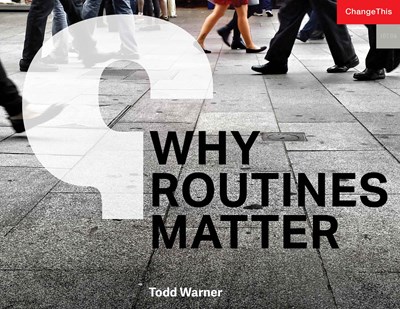
Blog / ChangeThis
Why Routines Matter
By Todd M. Warner
"The number of articles about successful people's habits are innumerable. Dating back to The 7 Habits of Highly Successful People by Stephen Covey, we've been obsessed with what it takes to do well. But for most people who work in large organizations, it is not that easy. Their lives are not defined by the ability to design their own habits, or routines; their work lives emerge from the environment that they work in, and the forces—operational, hierarchical, and functional—that exert themselves on their daily lives. Successful people in these environments, we've found, have routines that are distinct to their social systems, and these routines differentiate their performance."
Categories: changethis
-
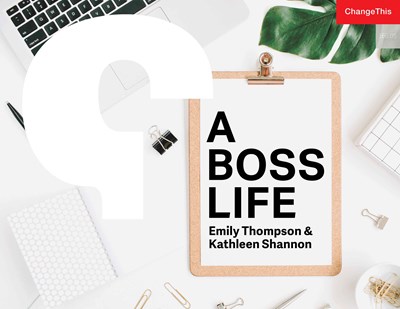
Blog / ChangeThis
A Boss Life
By Emily Thompson, Kathleen Shannon
"No matter how you've come to entrepreneurship, you may find yourself needing some direction. You're just trying to figure it out as you go, and guess what—so is everyone else! This manifesto is here to give you the guidance you crave and to let you know we're in it together. Being boss is a constant practice, and after three years of hitting publish on our podcast (and now a book) we've learned that it's conversation that is constantly evolving. Here are some key patterns and foundational insights we've picked up along the way."
Categories: changethis
-
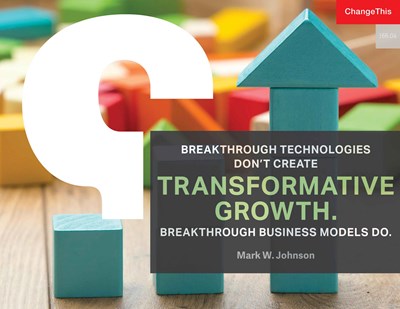
Blog / ChangeThis
Breakthrough Technologies Don't Create Transformative Growth. Breakthrough Business Models Do.
By Mark W. Johnson
"Adding digital capability to a product or to an entire business may improve it and make it more profitable, but technology alone is not enough to propel the kind of sustained growth that can transform your whole enterprise. The business model that goes with that technology is absolutely key to its success or failure. This was true when Amazon sold its first book online in 1995, when Netflix shipped its first DVD in 1998, and when Apple launched its revolutionary iPod in 2001. It was true in 2011, when Uber dispatched its first car, and it is even more true today. But it is still not widely understood."
Categories: changethis
-
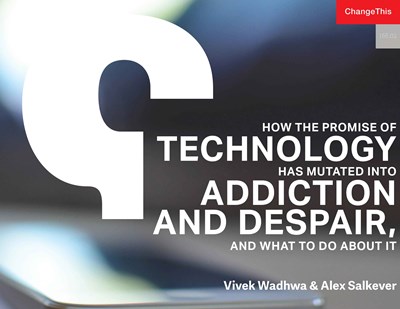
Blog / ChangeThis
How the Promise of Technology Has Mutated Into Addiction and Despair, and What to Do About It
By Vivek Wadhwa, Alex Salkever
"When you look back on your life, what would you change. Many of you might wish you had spent more time with family and friends. Some of you might wish you had spent more time outside or doing things you love. The good news is, you can actually make a simple change that will grant you these wishes, and probably many other wishes you have. Change the way you interact with technology. What does that mean. Well, let me ask the question another way. How many of you, when looking back, wish you had spent even more time on social media. More time on Slack or answering emails. More time aimlessly surfing YouTube looking at random cat tricks or strange but useless videos. More time looking at the perfect vacation pictures of high school acquaintances you don't really care that much about. More time checking texts for work late at night. The way we use technology is, far too often, broken, brain dead and utterly dehumanizing. It is negatively impacting our happiness. And it needs to change. This is not to say we can or should pull the plug.
Categories: changethis
-
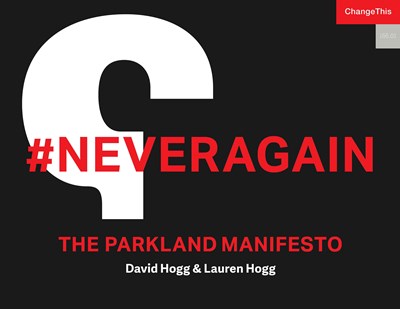
Blog / ChangeThis
#NeverAgain: The Parkland Manifesto
By David Hogg, Lauren Hogg
"We learned so much at Marjory Stoneman Douglas. We studied Supreme Court decisions, read Shakespeare, and explored the mysteries of black holes. We spent a huge amount of time on contemporary issues like poverty and the environment. In our psychology classes, we talked about death and grief and mental illness. We debated gun control and the NRA. We spent a whole week studying school shootings. But it all seemed a little bit distant, a little bit like a dream. Either it happened before we were born, or it was happening somewhere else. When it happened to us, we woke up. We knew we couldn't wait until we got out of college and settled into jobs. We had to make the world a better place now. It was literally a matter of life and death. So we stood up and tried to make our voices heard. We're really proud of what we have accomplished so far, and are so grateful to all the people who have joined our cause. They gave us strength. They gave us hope. You give us hope. But let's face it—it's not enough.
Categories: changethis
-
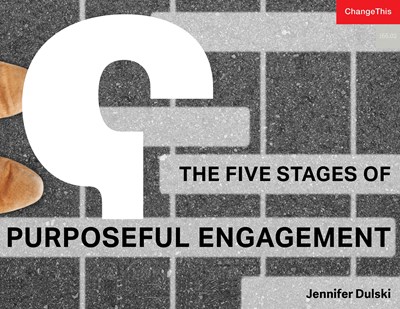
Blog / ChangeThis
The Five Stages of Purposeful Engagement
By Jennifer Dulski
"While at Change. org, I got a unique perspective into the world of decision-makers because of the more than one thousand campaigns started every day on the site asking people and institutions for change. From the data, I've seen that there are a series of predictable stages decision-makers tend to go through as they react to campaigns that are directed at them. I call them the Five Stages of Engagement: denial, listening, acceptance, embracing, and empowering. Not all decision-makers go through each of the five stages, but we do see each of these stages play out on a regular basis. Understanding the stages can help you be more effective in persuading decision-makers that you are working to influence. In particular, helping decision-makers see the risks that come from denial and the benefits that come from listening and then acting can help you make your own case more persuasive. For the purposes of describing each stage briefly below, I've referenced petitions to corporate decision-makers, since they take place in a shorter time frame and clearly demonstrate each stage.
Categories: changethis
-
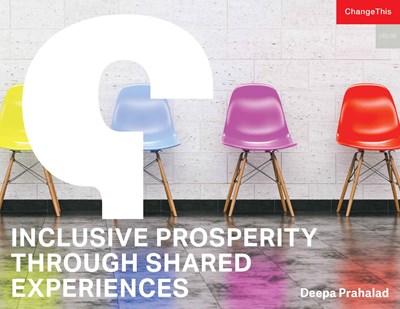
Blog / ChangeThis
Inclusive Prosperity through Shared Experiences
By Deepa Prahalad
"Forget Calls to Action and apology tours. There has never been a better time for companies who are serious about 'making the world a better place' to do so. Changing global demographics and megatrends have lowered the cost of learning. Millennial attitudes have made engagement on social issues more urgent and less risky. Companies today can help to reduce inequality and strengthen society through the creation of shared experiences. They can also gain new managerial capabilities in the process. The recent experience of emerging markets offers some critical insights."
Categories: changethis
-
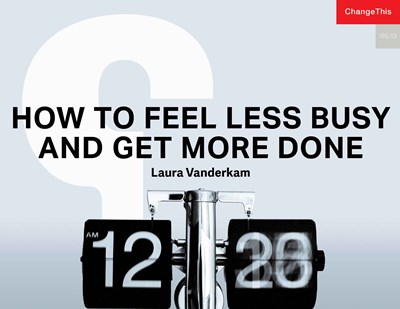
Blog / ChangeThis
How to Feel Less Busy and Get More Done
By Laura VanderKam
"In years of studying people's schedules, I've talked to plenty of busy people who seem rushed and harried. Yet others, with similar time demands, seem relaxed. I well recall a conversation with an executive I hoped to interview about her astonishing productivity. I began our call with an assurance that I would not take much of her time. She laughed. 'Oh, I have all the time in the world,' she said. Wouldn't it be nice to feel like that? For my new book, Off the Clock, I recruited 900 people with full-time jobs and families to track their time for a day. I asked how they felt about their time. I analyzed the differences between people who felt starved for time, and those who felt time was abundant. These seven strategies came up again and again—and can help anyone feel less busy while getting more done."
Categories: changethis
-
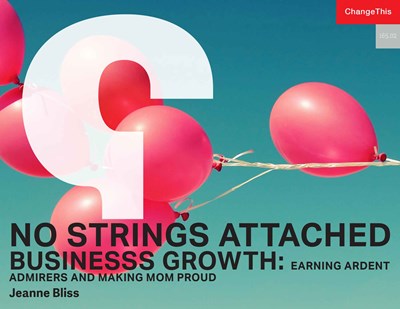
Blog / ChangeThis
No Strings Attached Business Growth: Earning Ardent Admirers and Making Mom Proud
By Jeanne Bliss
"Necessity may be the mother of invention. But mothers are an inspiration to virtuous business growth. Their no strings attached treatment reminds us of what pulls us toward people who have our best interests at heart. The best companies focus on helping customers achieve their goals—and grow as a result. Like our moms they are selfless, brave, and think of us first. They start with our life and earn the right to grow by proving with their actions, not their words that they are in our corner."
Categories: changethis
-
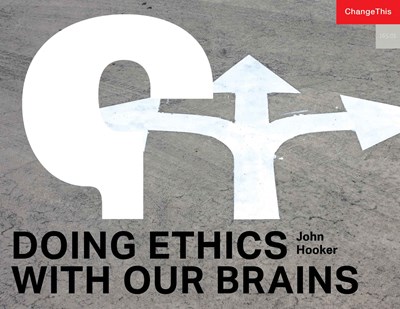
Blog / ChangeThis
Doing Ethics with Our Brains
By John Hooker
"We are told that we live in a post-truth age. When the facts get in the way, we turn to 'alternative facts' that serve our purposes. Rather than listen to another point of view, we focus only on arguments and talking points that support our ideology. Not everyone is like this, of course, but it seems to capture the tenor of the times. Worst of all, it exacerbates the polarization that so many worry about, because we can't find common ground. The root problem, in my view, is a gradual abandonment of rationality. We can't reach consensus because we no longer acknowledge a rational basis for resolving disputes. Ethics was an early casualty of this retreat from reason."
Categories: changethis

